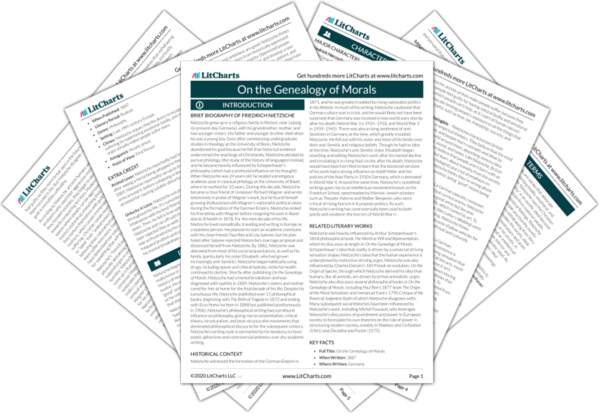Nietzsche uses the metaphor of physical “health” to symbolize cultures that encourage humans to thrive, flourish, and experience joy. To Nietzsche, healthy cultures embrace a moral code that acknowledges humans are innately aggressive, adventurous creatures. Such cultures, epitomized by Ancient Greece and Rome, provide outlets (like violent festivities and sports) for people to express and release their aggression and desire for conflict. These cultures also focus on encouraging people to actively pursue their personal interests, to be strong, and to live as fully realized human beings. In describing such cultures as “healthy” rather than merely functional or effective, Nietzsche uses physical health as a tangible representation of emotional and spiritual health, emphasizing the very real benefits that a flourishing culture can have on individuals.
By contrast, Nietzsche uses physical “sickness” to symbolize cultures that make people suffer. Nietzsche thinks that 19th-century European culture—rooted in Christian values that advise people to be kind, patient, humble, and chaste—is a prime example of a sick culture. The prevailing moral code in modern Europe tries to minimize conflict and aggression, and it demonizes these aspects of the human experience. Nietzsche thinks that when people try to repress their inherent aggressive tendencies, they suffer emotionally and spiritually much like a sick person would suffer physically. Under a Christian value system, people either turn their aggression inwards and berate themselves for having aggressive urges, or they become hateful and prejudice toward people who don’t restrict themselves. Such behaviors cause unnecessary suffering and inhibit joy. These cultures are thus “sick,” because they make people feel worse rather than better.
Sickness and Health Quotes in On the Genealogy of Morals
Look into the background of every family, of every institution, of every community; you will see everywhere the struggle of the sick against the healthy[.]
‘I suffer: someone is to blame’—all sick sheep think this. But his shepherd, the ascetic priest, says to him, ‘Quite so, my sheep, it must be the fault of someone but you yourself are that someone, you alone are to blame—you yourself are to blame for yourself;’ that is bold enough, false enough, but one thing is at least attained thereby, as I have said: resentment is—diverted.












